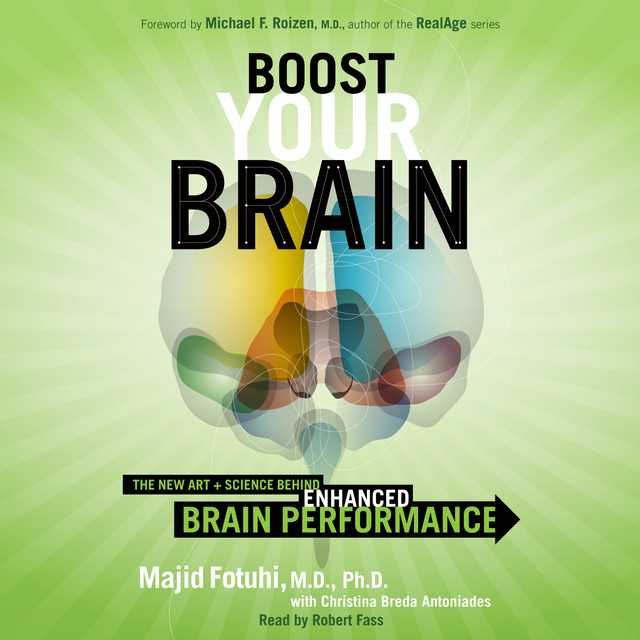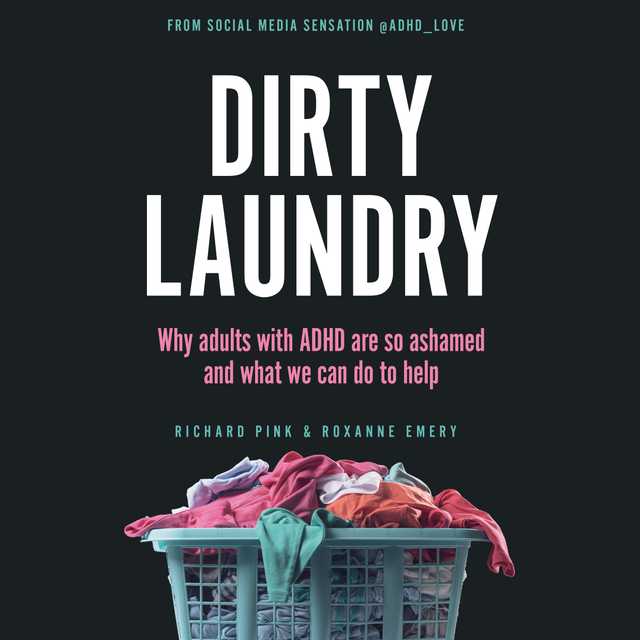Boost Your Brain Audiobook Summary
Based on cutting-edge science, Boost Your Brain is internationally recognized neurologist Majid Fotuhi’s complete program for increasing brain size and enhancing brain function, including memory, creativity, comprehension, and concentration.
Our brains don’t have to decline as we get older, argues Dr. Fotuhi. Depending on the things we do or neglect to do, we can actually get smarter and measurably improve our brain speed. In Boost Your Brain, the founder of the Brain Center and host of the PBS series Fight Alzheimer’s Early offers a three-month brain-optimization program–with noticeable results in just a few weeks.
Boost Your Brain explores the very latest neuroscience research and offers actionable, authoritative advice on how readers of every age can experience the benefits of a bigger, better brain. Boost Your Brain: The New Art and Science Behind Enhanced Brain Performance includes a foreword by Michael Roizen, M.D., coauthor of the bestselling YOU series and author of the Real Age books.
Other Top Audiobooks
Boost Your Brain Audiobook Narrator
Robert Fass is the narrator of Boost Your Brain audiobook that was written by Majid Fotuhi
Majid Fotuhi, M.D., Ph.D., has created the NeurExpand Brain Center (www.neurexpand.com) and serves as its chief medical off cer. He has more than twenty-f ve years of clinical, research, and teaching experience at Johns Hopkins and Harvard Medical School, is the recipient of the distinguished teaching award from the American Academy of Neurology, and has appeared on CNN, ABC, Discovery Channel, and The Dr. Oz Show.
About the Author(s) of Boost Your Brain
Majid Fotuhi is the author of Boost Your Brain
More From the Same
- Author : Majid Fotuhi
- The Memory Cure
- The Memory Cure
- Publisher : HarperAudio
- Abraham
- American Gods [TV Tie-In]
- Dead Ringer
- House of Sand and Fog
- Prey
Boost Your Brain Full Details
| Narrator | Robert Fass |
| Length | 9 hours 57 minutes |
| Author | Majid Fotuhi |
| Category | |
| Publisher | HarperAudio |
| Release date | September 10, 2013 |
| ISBN | 9780062293176 |
Subjects
The publisher of the Boost Your Brain is HarperAudio. includes the following subjects: The BISAC Subject Code is HEALTH & FITNESS, Healthy Living
Additional info
The publisher of the Boost Your Brain is HarperAudio. The imprint is HarperAudio. It is supplied by HarperAudio. The ISBN-13 is 9780062293176.
Global Availability
This book is only available in the United States.
Goodreads Reviews
Melissa
March 11, 2020
I often don’t review the nonfiction books I read, but I felt this one was important to share. This is an older book (published 2013) I downloaded on my iPad years ago when it was on sale. It’s one of many parked on my e-reader about brain health that has been awaiting my attention, for – as many of you know – my father was diagnosed with vascular dementia a few years back. For obvious reasons, these kinds of books are speaking to me: out of concern for my dad and a wish to understand what’s happening to him, and fear for my own future.After reviewing the various books I’d downloaded over the years, this spoke to me the loudest. And while many readers have criticized it as “nothing new to see here,” I had a completely different reaction. This book cites all the many ways adults – even later in life – can continue to grow their brains. It gives specific suggestions. Is diet a big part of it? Sure. Exercise? Sure. Social interaction, trying new hobbies, practicing memorization? Yes, yes, yes.But, for me, it was much more than a re-hash of the same old information. Facts were backed by scientific studies, anecdotes from patients, and actual brain scan results that SHOW growth and shrinkage in the brain. It is one thing to know, intellectually, that you should avoid sugar, exercise, and challenge your brain, but it is another thing entirely to see the medical evidence of how not doing so can impact brain performance and shrink/damage your brain. Indeed, there is the fear factor within these pages, the examples of the ways in which we unwittingly harm our brains … which – for me – is a big motivator. I’m afraid of becoming my dad. And when I read how just being a little overweight can decrease gray and white matter, and shrink the size of the hippocampus, then yeah … I’m going to pay attention.But mostly, I just wanted some tools in my arsenal to stay mentally alert and focused so that I can continue to live a creative life as I age. This book offers customized plans of attack to increase brain health in three months. I’ll report back once I’ve implemented them!As a final note: the book is well-written and accessible. My only complaint is that the worksheets/fill-in charts are scattered throughout the book (rather than all in one place), and if you read electronically, there is no way to print them, other than to hunt them down and do screen captures. It would have been nice to receive a web link to the worksheets, or to simply include all of them in an appendix for quick reference. I spent a lot of time getting my ducks in a row to begin my plan of attack. In the end, it likely will have been worth the slight inconvenience, though. I would actually recommend buying this in print so you can flip back and forth. (I ended up buying both). More in three months!
Sal
March 10, 2014
In the land of brain books, the differing take-away from “Boost Your Brain…” is the correlation between brain health and brain size. And a defined program to increase both.Brain size can be reduced through unhealthy living habits such as lack of exercise, or sleep and a poor diet – unhealthfully stressful living (there is such a thing as “healthy stress”). The good news is that the damage is mostly reversible. Where this book is also different from many is that it outlines a 12 week program, tailored to where one is in the spectrum of healthy habits. This plan ultimately increases focus, memory and creativity, and more importantly, could delay or eliminate dementia later in life.Naturally, the fixes include exercise, specific habits and specific foods or supplements. None of it is onerous nor, frankly, too surprising.The latter part of the book focuses on the link between ongoing brain-healthy habits and the onset of dementia and Alzheimer’s in old age. And it is a direct link – very, very few who succumb to the affliction are genetically destined to it. The book I’m currently reading (“Grain Brain” to be reviewed later) calls Alzheimer’s and cognitive decline “Type 3 Diabetes” – as avoidable and fixable as Type 2 diabetes (formerly called “Adult Onset Diabetes” but renamed as larger percentages of those diagnosed are children).The author (an alphabet-soup-suffixed doctor) gives scientific evidence, some of the studies made very recently, for each discussion point in an easy-to-digest style.It’s a startling book, really, especially in light of several other books on the topic that point to the same, or even more disturbing - different studies, that lead to this conclusion – exercise is a tremendous predictor for cognitive health. It doesn’t even take much of it to make a difference.Given the enormous stack of evidence, it is amazing to me that more aren’t aware of the risk factors involved. And, if aware, aren’t making changes in their lifestyles. I know it is difficult and the long term mindset is against the grain of how human behavioral modes operate… but… :headdesk:For myself, I’m not going with the herd on this one. I may be a proud member of the rat race, but I’m planning on finishing it with my little rat brain as intact and as full as it can potentially be – right up to my last cheesy breath.I really wish more of you were going to be around to keep me company.
Feng
February 09, 2019
Boost Your Brain: The New Art and Science Behind Enhanced Brain Performanceby Majid FotuhiThis book is about how people can improve the capacity of their brains and prevent (delay) old age brain decline. The author Fotuhi is a neurologist at the Johns Hopkins University.The central premise of the books is a brain is a continually changing object. It grows or shrinks in response to the many factors in life, aging being just one of them. Therefore, by adopting a brain-healthy lifestyle and avoid brain-shrinking risk factors, we can improve brain health in general and prevent and compensate for the brain decline due to aging. Brain health includes four aspects: the number of neuron cells, the number of neuron connections (synapses), the state of oxygen supply to the neurons (blood vessels), and the state of information super-highway (long range, high capacity neuro-connections). On the practical side, the book outlines a “12-week program” to boost brain power. Such program includes exercise (mainly aerobatic and interval training), diet (avoid “brain-shrinking foods such as salt and trans-fat, add Omega 3, flavonoids and vitamins B12, D, E), relaxation exercises to keep the brain in an alpha-wave mode more, and mental exercises for more stimulation to the brain. For each class of activities, the author provides three tracks to allow for a gradual increase of practice intensity depending on the current status. The book also discussed health conditions that are harmful to the brain, especially to memory functions. These risk factors include medical conditions such as diabetes and hypertension, stress, overweight, stroke (including micro strokes that usually do not show any symptoms), brain injury such as concussion and brain infection, and alcohol abuse. The book points out that even conditions with minor or no acute symptoms may cause brain shrinkage in the long run. Furthermore, in many cases, brain damages caused by these conditions can be reversed if treated properly. Therefore, we should pay attention and seek diagnosis and treatment as soon as possible.Almost all of the advice are consistent with common health practices, especially those for cardiac health. The notable addition is mental exercises. In this sense, the book is not exactly life-changing. However, this book points out the exact benefits to brain health and cognitive abilities, backed up by research findings. It provides additional motivation for the readers to follow these practices. Unlike other books in this class, this book includes a large number of citing to research results, exceeding the need for claiming credibility. I consider the discussion of brain researches as an independent contribution of the book, aside from its practical advice. Especially valuable are the author’s comments, which point out what the investigations prove and not prove. For example, in many places, the author points out that just because two phenomena occur at the same time, it does not mean one causes the other. The author also described in detail many studies involving controlled groups. These description provides a sense of the level of certainty of the results.At the end of the book, the author recounted the discovery of the Alzheimer disease and subsequent explorations. He pointed out that Alzheimer disease and dementia are not the same, and the Alzheimer disease as we see today is not single-cause and probably does not have a single cure. This part is a fascinating scientific story on its own right.Overall, this book is both practical and intellectually engaging. The “12-week plan” is probably more valuable for its principles rather than detailed implementations. The book is repetitive in some parts and over-simplifying in others (brain health is much more than “growing” and “shrinking”). However, it is still a great book to read if you are interested in how the brain works and how to take care of it.Detailed notes follow.• Four factors of boosting brain healtho Increase synapses o Build more highways (fiber bundles)o Improve oxygen supply (more blood vessels)o Build more neurons• Brain-body connection: brain health is closely tied to body health. Many body conditions are harmful to the brain. The important ones are obesity, lack of V-B12, and lack of exercise.• Brain-boosting activitieso Exercise: Studies show aerobic exercises lead in growth in hippocampus size and improved cognitive testing performances (short term memory). Aerobic exercises bring other benefits:• Increased level of BDNF• Increased frontal cortex size• Improved oxygen delivery and increased blood vessel network• Better tuned brain states (alpha states) Intensive exercises (e.g., brisk walking vs. stretching) are more effective. Interval training (30 seconds on and off) may be especially effective. Goal: 30 minutes of aerobic every day, 15 minutes strength building 2 days a week. Intensive impulse training: 1 minute intensive, 2 minutes relaxing, 5 times (total of 15 minutes)o Food: Start with a healthy balanced diet• Mediterranean food helps brain functions and brain health.• Cut salt intake. Below 1 g per day.• Avoid trans-fat, which is present in donuts and mass-produced cookies.• Avoid high saturated fats and high sugar foods. They not only cause cardiovascular problems and obese but also bring damage to the brain. Choose food with a lower Glycemic index.• Add Omega 3 to diet. It is proven to improve brain function in both the short term and long term. Flavonoids: add the following foods to diet regularly to provide beneficial brain flavonoids: • Apple• Spinach• Blueberry• Coffee (in moderation)• Dark chocolate (for coco)• Red Grape• Tea• Pecan• Peanuts and other nuts• Tomato Vitamins• B12. Target blood level: 500.• D• Eo Relaxation: stop brain hyperactivity. Promote alpha wave (slower wave), which is a calm and alert mode. Reduce beta wave (faster wave), which should be used only for short bursts of short, concentrated mental activities. The following activities all have long term effects in calming the brain and improving cognitive function levels. Meditation in 30 minutes sessions Yoga and Taiji Drumming: just follow the rhythm. Clapping would be fine, too. Biofeedback.o Mental Exercises Engaging in tasks that require mental and cognitive efforts help to grow the corresponding parts of the brain. Use all opportunities to conduct mental exercises in daily life. Try not to rely on calculators and GPS guidance. Diverse your mental activities. Learning new things is more beneficial than doing the same activities over and over. Social interactions also require a lot of cognitive skills and benefit the brain. Memory training: memory training would help grow the hippocampus• Memory champaign: showing the potential• Tips for better memory:o Make things memorable by making them dramatic and emotionalo Make things novel for ease of remembering. For example, associate a person’s character with his name to form a novel image (e.g., short-legged Bob bobbing up and down in trying to reach something).o Chunkingo Practice memory is important because in the digital age we use our memories less and less.• Other mental exercised (in the handout)o Omitted because the book was expired.• Spend some time for self-reflection: what do you want most? What do you enjoy most? How to change your life, so you spend more time on things you like to do?• Put it in action: a rehash of the three tracks, etc. Basically, it has the following componentso Gradual start: depending on your current state, start with easy activities and gradually bring yourself to the desired state.o Baselining: perform a self assessment (more on behavioral observations than actual cognitive tests).o Get frequent feedback: you should expect noticeable improvements in weeks.• Brain shrinker factorso Medical conditions: diabetes, obesity, hypertension, etc. Most of these problems are curable or controllable. But awareness and initiatives are required to avoid damages to the brain.o Sleep: insomnia and OSA (obstructive sleep apnea) bring significant short term and long term brain damage. Fortunately, most of the damages are reversible. So it is important to recognize and address these problems. Studies have shown that sleeping aids can improve the brain functions of insomnia patients. However, a better course might be removing the causes (stress, lifestyle, hormonal abnormality, etc.) of insomnia.o Stress: stress and related syndromes such as high cortisol levels impacts brain function and shrinks the brain. In some cases, stress relief comes from adjusting the life perspectives/ The ABC method that aligns values, situations and responses can be effective. Related problems: depression (often caused by stress) and PTS (an extreme version of stress). Low levels of stress may not be discernible, yet still damaging to the brain. For example, low-level noise in office causes elevated levels of cortisol and reduced cognitive capacity. o Overweight: overweight (BMI 25-30) and obesity (BMI >30) both reduce brain sizes. Related problems, especially diabetes, causes significant brain damage. Inadequate cholesterol levels not only increases risk of stroke but also causes brain damage even without stroke. Target levels: HDL>60, LDL and Tri < 100.o Stroke It is well known that strokes are dangerous. However, some micro strokes do not have apparent symptoms. Yet they cause long term damage to the brain. To avoid damages caused by stroke, avoid risk factors such as hypertension and high cholesterol level.o Brain Injury Brain injury due to impact or disease may cause brain shrinking, even after decades. Some brain injuries do not have obvious symptoms and can be unknown. So it is important to check out after impact or other potentially dangerous events.o Substance abuse Alcohol and cigarette cause brain damages in many ways. Avoid these substances.• Alzheimer Diseaseo Alzheimer disease is one type of dementia, although people often use the two terms interchangeably.o There are many types of dementia, some inheritable and some due to other factors.o There are two types of Alzheimer disease: the early onset one is mainly inheritable. The later onset type is far more common and is due to many risk factors.o It seems Alzheimer disease represents a particular type of brain damage. However, such damage can be caused by different risk factors.o One way to fight Alzheimer disease is building up more brain reserve. Typically, symptoms only happen when the brain is damaged beyond some tipping point.• The Future of Neuroscienceo From the history of Alzheimer disease research, we can see how fast neuroscience has progressed. Alzheimer first linked dementia with brain plaque. Yet, later researches show dementia is multi-factored. Plaque may be a correlation, not cause. Today, it seems like there is no single cure for dementia. However, various ways of boosting brain health reduce the risk of dementia.o In the future, brain imaging will significantly improve our understanding and produce a new cure for brain diseases.o On the other hand, modern technologies may rob us the opportunities to exercise our brain.o Brain-boosting techniques described in this book are proven methods to improve our cognitive abilities and delay brain aging.
Sergey
January 14, 2023
Only 24% of brain performance is defined by genes. The rest - lifestyle and environmentHave a goal in life and be excited about itBrain health risk factors: hearing and vision loss, insomnia, snoring, heart issues, smoking, alcohol, obesity, sexual disfunction, urination issues, back painDo physical exercise 5 times per week: 30 minutes jogging and 15 minutes resistance exerciseEat food with low glycemic indexEat salmon twice per week and consume fish oil supplement, eat flaxseed oil, walnuts, canola oil, blueberry, spinach, apples, cholocal, 1 cup of coffee and 1 cup of tea, pecans, pistachios, tomatoChange routine from time to time, socializeTo memorize things: 1. Use weird images 2. Make them emotional 3. Chunk data 4. Associate 5. RepeatCatching on sleep may not workTo check for stroke: 1. Ask a person to smile 2. Ask a person to raise hands 3. Ask a person to repeat a simple phrase 4. Call emergency if issues with 1, 2, 3Type A personality has a higher risk of brain damageAvoid social networks and other Internet distractionsStay curiousAvoid electronics 1 hour before sleepGet up at the same time each dayIf you cannot sleep for more than 20 minutes, get up and do some quite activity like readingA little bit of stress is goodNoise is badSmile and laugh regularly
Mark
March 28, 2014
It's a thorough and encouraging book by a distinguished clinician. Many of the things I should do--healthy diet, regular exercise, reduce stress--I already knew, but his evidence and case histories help with motivation.
Robertcool
October 16, 2013
Boost Your Brain by Majid Fotuhi is a great book on brain health and delaying dementia.
JORGE ROSARIO
June 23, 2018
Extraordinary workI bought this book because October 2017, I was diagnosed with vascular cognitive impairment with memory loss. I never thought about all the brain shrinkers I entertained. This book thought me a lot in a clear, to the point, well organized, easy to understand language and format. I feel that I improved somewhat. I recommended the book to my therapist. I sincerely thank the author. Brilliant!
Traci
February 23, 2019
Everyone should read this bookThis book is well-written, fascinating, and provides concrete steps you can take to increase your brain health.I know far too many people with severe cognitive impairment. While there’s no guarantee that following the recommendations in the book will keep me safe from such cognitive impairment, the evidence is compelling.
LAUREN
October 03, 2021
Great, diverse, actionable information about how to care for and improve our brains - whether young or old. Very readable, understandable presentation of the information.
Lucie
March 06, 2019
Wonderful book written by a man who was first a Ph.D. in Neuroscience and then became an M.D. specializing in Neurology. He really likes studying the brain. Apparently it used to be thought that once we reached age 50, the brain would begin to shrink and nothing could be done about it. But he has conducted many studies and studied many that show that there are things we can do to make our brain stop shrinking, and even grow a bit after 50 by following a healthy life style. His suggestions are all very practical, do-able, and just absolutely make sense. I first bought this on my Kindle from Book Bub, but ended up buying a hardback so I could jump around on chapters, keep notes, underline, and just make a real study of it. Topics covered in this very readable book are weight, exercise, eating habits, sugar, salt, cholesterol, meditation, brain trauma, brain exercises, belly fat, depression, Alzheimer's, children, hippocampus, memory, DHA, flavonoids, B-12, Vitamin D, sleep, aging brain, stress, BMI, stroke and more. I have learned a lot from reading this book.
Bob
March 23, 2021
Well researched, with a lot of analogies and explanations to make the science part accessible. Age-related mental decline is not inevitable, but we have to take care of ourselves. Exercise and good diet go a long way toward keeping our brains fit, as well as other "tools." The book explores the current state of research about those things that "boost" our brain and those things and habits that lead to cognitive decline. There are a lot of books on this subject that are not grounded on scientific research, but this one seems to take the science seriously. Fotuhi includes practical steps anyone can take to put the research into practice in their own lives.Recommend.
Ivan
March 29, 2014
De los tres libros que he leído sobre el tema éste es sin duda el que me ha parecido mejor. Sin embargo, todos tratan básicamente de lo mismo y ofrecen como denominador común las tres mismas acciones. A diferencia de los otros, creo que el acercamiento que ofrece este libro para mejorar la función cerebral es mucho más completo, más factible y la ciencia (o sea la evidencia que ofrece) mucho más convincente.
Denis
May 16, 2016
This guys knows what he is talking about. He is on the right track with great information but it is just scratching the surface, great for a beginner on the subject of brain boosting but missing some more advanced measures such as nutritional supplements, diet changes and even nootropics. Great book on a fascinating subject.
Maurice
May 02, 2016
Act Now, Prepare Your Body and Your BrainI have rated Boost Your Brain 5 stars as I want as many people to consume the information as possible. It is well documented and provides proof of the connection between living a healthy lifestyle and a health brain particularly as we age.
Pamela
December 17, 2015
Interesting.
Mazen
April 17, 2014
Really good and scientific.Read it and you'll find a lot of useful information.
Frequently asked questions
Listening to audiobooks not only easy, it is also very convenient. You can listen to audiobooks on almost every device. From your laptop to your smart phone or even a smart speaker like Apple HomePod or even Alexa. Here’s how you can get started listening to audiobooks.
- 1. Download your favorite audiobook app such as Speechify.
- 2. Sign up for an account.
- 3. Browse the library for the best audiobooks and select the first one for free
- 4. Download the audiobook file to your device
- 5. Open the Speechify audiobook app and select the audiobook you want to listen to.
- 6. Adjust the playback speed and other settings to your preference.
- 7. Press play and enjoy!
While you can listen to the bestsellers on almost any device, and preferences may vary, generally smart phones are offer the most convenience factor. You could be working out, grocery shopping, or even watching your dog in the dog park on a Saturday morning.
However, most audiobook apps work across multiple devices so you can pick up that riveting new Stephen King book you started at the dog park, back on your laptop when you get back home.
Speechify is one of the best apps for audiobooks. The pricing structure is the most competitive in the market and the app is easy to use. It features the best sellers and award winning authors. Listen to your favorite books or discover new ones and listen to real voice actors read to you. Getting started is easy, the first book is free.
Research showcasing the brain health benefits of reading on a regular basis is wide-ranging and undeniable. However, research comparing the benefits of reading vs listening is much more sparse. According to professor of psychology and author Dr. Kristen Willeumier, though, there is good reason to believe that the reading experience provided by audiobooks offers many of the same brain benefits as reading a physical book.
Audiobooks are recordings of books that are read aloud by a professional voice actor. The recordings are typically available for purchase and download in digital formats such as MP3, WMA, or AAC. They can also be streamed from online services like Speechify, Audible, AppleBooks, or Spotify.
You simply download the app onto your smart phone, create your account, and in Speechify, you can choose your first book, from our vast library of best-sellers and classics, to read for free.
Audiobooks, like real books can add up over time. Here’s where you can listen to audiobooks for free. Speechify let’s you read your first best seller for free. Apart from that, we have a vast selection of free audiobooks that you can enjoy. Get the same rich experience no matter if the book was free or not.
It depends. Yes, there are free audiobooks and paid audiobooks. Speechify offers a blend of both!
It varies. The easiest way depends on a few things. The app and service you use, which device, and platform. Speechify is the easiest way to listen to audiobooks. Downloading the app is quick. It is not a large app and does not eat up space on your iPhone or Android device.
Listening to audiobooks on your smart phone, with Speechify, is the easiest way to listen to audiobooks.






























